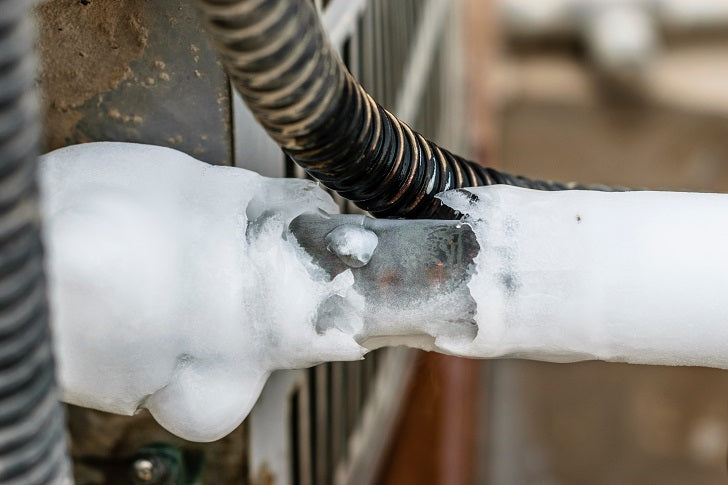The days just seem to get hotter and more humid as summer continues. With the temperatures increasing, you depend heavily on your home’s air conditioner to keep you cool and comfortable. The most effective thing you can do to ensure that this appliance runs efficiently all season long is to schedule an annual maintenance appointment. That’s when many potential problems can be caught and dealt with early — before resulting in an expensive breakdown.
Many homeowners mistakenly believe that if their air conditioner seems to be running “just fine,” then they don’t need to worry about making an appointment for a cooling system tune-up. Wrong. Without proper maintenance, your AC could face a variety of problems which may affect its efficiency and your family’s overall comfort. One of the most common issues resulting from improper maintenance is an AC leak.
Common causes of an AC leak
Dirty, clogged air filter
The most common cause of an air conditioner leak is a dirty filter. You should replace this filter at least once a month during the peak of the cooling season. Airborne contaminants like pet hair, dander, dust, etc. get trapped by the filter. When you neglect to swap the filter out as often as you should, conditioned air from your AC can’t pass through as easily as it should.
In turn, this can ultimately lead to frozen evaporator coils. These coils contain the refrigerant which helps your AC absorb heat from the air in your home. To function efficiently, the coils need proper airflow to and from your system. This can’t happen when you have a clogged air filter, and ice can form on the coils as a result.
If you can see ice forming on the evaporator coils, it’s a warning sign. Additionally, since the refrigerant isn’t able to absorb heat from inside your home, you may notice that your house feels warmer than usual.
If you suspect that this is the cause of your leaking AC, turn the unit off and contact a cooling professional as soon as possible. Restricted air flow to your unit can also lead to a variety of other problems if left untreated — such as a damaged compressor, which could be costly to repair or replace.
Cracked drain pan
The main role of the drain pan is to collect condensation from your home’s air conditioner via the condensate drain line. It’s located underneath your indoor air handler, and it’s recommended that homeowners periodically check the pan for signs of damage, such as cracking in the bottom or on the corners (which can lead to leaks).
Before checking the pan, make sure power to the air conditioner is turned off so you don’t risk electrocution or damage to the appliance. Next, remove the drain pan and perform a visual check for any signs of damage. You should also take a look at the condensate drain line that is often connected to this pan. If it appears to be damaged or leaking, it will need to be repaired by a professional.
It is not recommended that you repair cracks or damage to the drain pan or condensate drain line using a store-bought sealant. These sealing materials are only a quick fix and don’t actually take care of the root cause of the problem. Save yourself time and aggravation by allowing a trained professional to inspect and repair (or replace) the damaged pan or line.
Clogged drain line
In addition to checking the outside of your condensate drain line for any cracks, ensure that the inside of the line is free of buildup. This is a part of the air conditioning system that often gets neglected since it’s out of sight/out of mind until there’s a problem. If you don’t have the drain line regularly cleared out, materials like algae and fungus can cause it to clog. When this happens, condensation from your AC won’t be able to drain properly, and this buildup could lead to a leak.
Many homeowners choose to take care of drain line maintenance on their own by routinely pouring vinegar inside to help kill algae or debris that may be collecting. Once you’ve let the vinegar sit inside the line for several minutes, use a wet-dry vacuum to suck out the waste. This will help to prevent a serious leak that could cause your AC to break down or not work as well as it should.
If you aren’t comfortable performing this maintenance task on your own, seek the help of a skilled cooling professional.
Additional AC protection for your home
Along with scheduling a yearly tune-up for your family’s air conditioner, replacing the filter monthly, and cleaning the condensate drain line routinely, it’s also recommended that you have a protection plan in place in case of an unexpected breakdown this summer.
At Oncourse Home Solutions, we offer an affordable Cooling Repair Plan. When you’re enrolled in the plan and a covered problem occurs in your home, just pick up the phone and give us a call. We will work with our network of trained service providers and schedule an appointment for a repair technician to help get your home cool and comfortable again as quickly as possible.
To see if the plan is available where you live, visit us online and enter your ZIP code. Available plans and pricing for your town will appear.


